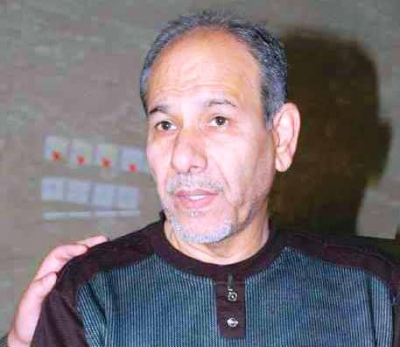Bahrain Opinion: Why Younis Ashoori's Imprisonment Points to Repression Rather than Reform
 Last Thursday, the US State Department's reaction to a Bahraini court's verdicts on 20 doctors and nurses --- "we are deeply disappointed" --- made headlines.
Last Thursday, the US State Department's reaction to a Bahraini court's verdicts on 20 doctors and nurses --- "we are deeply disappointed" --- made headlines.
Beyond those headlines, however, that reaction appears to have had little impact on the regime. On Sunday, Younis Ashoori, a 61-year old hospital administrator, did not receive the final verdict in his trial. Instead, the hearing was postponed for a fortnight.
Ashoori, an administrator at Muharaq Maternity Hospital, has been held in prison for more than a year, serving a three-year sentence. The initial charge was "inciting hatred against the regime", but this has been dropped. His alleged crimes now are that he took oxygen cylinders to a medical tent and replaced pictures of Bahrain's leaders with Shia religious symbols.
Yesterday's postponment extends not only Ashoori's imprisonment, but also his physical suffering: he has been seriously ill with kidney stones and an enlarged prostate since he was seized by security forces last March. In his last court hearing, Ashoori stated that, following torture, he began urinating blood and was taken to a military hospital. When he told the doctor that it was his kidney causing him pain, the doctor allegedly responded by punching him in the spot. Today, he is in need of specialist treatment, but is only receiving basic painkillers and visits from a general doctor.
This March, Younis was described by Brian Dooley of Human Rights First as "one of Bahrain’s forgotten prisoners". He is among political detained health professionals -- including Hassan Maatouq (30), Ahmed Almushatat (27), Hasan Alarabi (27) and Ahmed Madhi Saleh (19) --- whose cases have received little attention. So their mistreatment by the regime appears to have been unseen and uncriticised by foreign powers.
Speaking in Bahrain on Thursday, US Assistant Secretary of State Michael Posner stated that the US was "deeply disappointed by these convictions", upheld on 11 of the 20 doctors and nurses, and urged "that the medics be allowed to remain at home pending appeal". He added:
We hope that this review will result in a dismissal of criminal charges in the interest of turning the page on the events of last year and repairing the social fabric of Bahrain.
Posner's concern echoes the US submission to the United Nations' Universal Periodic Review on Bahrain, which drew "particular attention to the ongoing prosecutions of 20 medical professionals," as well as that of Abdulhadi AlKhawaja, the human rights activist given a life term last June.
However, individuals like Younis Ashoori and the rest of the estimated 750 political prisoners rarely warrant comment --- and certainly never "particular attention" --- from Western officials or media. Instead, they are given little more than generic "concern".
When Posner says, "It’s really up to the people of Bahrain to chart their own destiny," he conveniently forgets that a majority of the population face daily suppression, economic insecurity and the torment of uncertainty about their family and friends, let alone about what tomorrow will bring. Ashoori and his family, forced to endure another fortnight of psychological torture, are clearly unable to "chart their own destiny".
However, with the occasional and selective words of criticism, the US is able to wash its hands of responsibility. Washington, attempting to stage mangage a process of "regime adjustment", sets small tasks --- e.g., release the 20 medics --- to its favourites in the regime such as the Crown Prince and Foreign Minister. Doing so, it attempts to signal to the world that reform from within the regime is possible and that the Bahrain Independent Commission of Inquiry were ot laughed at on the day the report was delivered last November. Meanwhile, as Posner was keen to emphasise on Thursday, America calls on the opposition societies to enter into political dialogue with the regime, suggesting that if they do, the so-called "reformists" in the regime will be empowered and the long-overdue implementation of the BICI recommendations and many more will occur.
When the regime upheld the convictions of nine medics on Thursday, it sent a clear message to the world that it is wedded to repression. Those verdicts suggests that Bahrain's leaders are far more keen to appease hardline and anti-Shia loyalists than to worry about what the West thinks. Postponing Younis' verdict is a clear sign --- if any further indication was needed --- that verbal chastisement has scant impact on this thinking.
Moreover, the ease with which the regime disregards due process, let alone show compassion for a sick and suffering man, is a direct consequence of the West's softly-softly approach to diplomacy, which readily forgives the regime's repression while insisting the opposition enter into dialogue with no let-up of the human rights abuses they encounter daily. Surely "dialogue" is a joke when one can be arrested for making critical comments, as happened recently to human rights activist Nabeel Rajab for his 140-character messages on Twitter.
On Tuesday, the latest attempt at "national dialogue" begins with the inaugural event of the Bahrain Foundation for Reconciliation and Civil Discourse. The BFRCD, given the full support of Washington's man, the Crown Prince, has a shiny website and a mission "to facilitate the exchange of ideas and values across all segments of Bahrain’s communities". The event, being held at the Sheraton Hotel, is entitled, "Reconcilliation Lessons from Northern Ireland".
Well, here's one lesson from Northern Ireland --- release the political prisoners, release Younis Ashoori and hundreds of those alongside him. That tangible action has to come before sincere, constructive, and inclusive dialogue can commence.

 Sunday, June 17, 2012 at 16:06
Sunday, June 17, 2012 at 16:06
Reader Comments